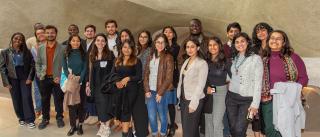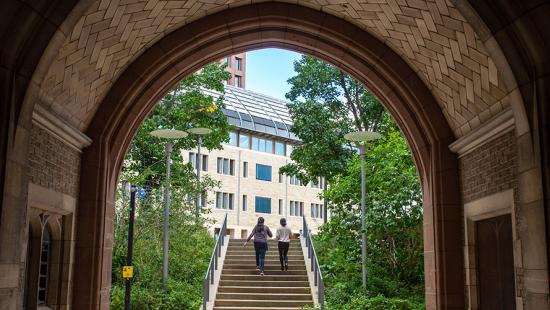
The inaugural Three Cairns Scholars tour the Museum of Natural History in New York City.
Three Cairns Climate Program for the Global South Frequently Asked Questions
On This Page
1. What is the Three Cairns Climate Program for the Global South at the Yale School of the Environment?
This transformative program is aimed at expanding the corps of outstanding environmental leaders throughout the Global South by reducing the barriers to advanced environmental education and training, supporting them to return to their home regions with the comprehensive training needed for success, and fostering a network of these alumni leaders to advance the climate solutions necessary to safeguard local natural resources, advance their economies, and secure a sustainable future. Funding from the Three Cairns Climate Program for the Global South supports two scholarship programs:
- Three Cairns Scholars is a scholarship program that enables YSE to meet 100% of the demonstrated tuition need for qualified students from the Global South admitted to one of its four master’s degree programs through the Three Cairns Scholars program. As Three Cairns Scholars, students have access to non-tuition resources, such as English-language support prior to arrival on campus, funding to support summer internships in their home countries, mentoring partnerships with YSE alumni, and career development opportunities and counseling that designed to help ensure their success while at Yale and when they return to their home countries and regions.
- Three Cairns Fellows: The Three Cairns Fellows program enables YSE to expand access to two of its highly rated online certificate programs for mid-career environmental professionals: Financing and Deploying Clean Energy (FDCE) and Tropical Forest Landscapes: Conservation, Restoration and Sustainable Use (TFL). Respectively, these year-long programs develop capacity for leapfrogging transitions to renewable energy and for managing the areas of highest potential for natural carbon sequestration: tropical forests. Their impact on climate solutions is tangible and immediate — with participants reporting that they were often able to use what they learned in the morning sessions in their work that same day. For admittance to a certificate program as a Three Cairns Fellow, please apply directly to the certificate program you are interested in:
2. Who is eligible to become a Three Cairns Scholar? How are Three Cairns Scholars selected?
International students from the Global South who are applying to the Yale School of the Environment master’s degree programs can fill out a supplemental application to the Three Cairns Scholars Program. However, citizenship in a Global South country alone does not guarantee admission to the program. A variety of factors are considered when evaluating individual applications, including but not limited to academic record and professional experience. The supplemental application is not meant to be onerous or a barrier to entry but will help identify students who are committed to combatting climate change and to returning to their home regions to pursue their environmental work following graduation.
3. Who is the Three Cairns Group?
Co-founded by Lise Strickler ’82 and Mark Gallogly in 2015, the Three Cairns Group is a mission-driven investment firm focused on accelerating the global transition to a low-carbon economy.
4. Why is the Three Cairns Climate Program focused on the Global South?
In sharing their intention to partner with YSE to establish this program, Three Cairns Group co-founders Lise Strickler YC ’82 and Mark Gallogly said: “The climate crisis is accelerating and requires urgent attention. While this crisis will affect everyone, it will not impact everyone equally. In many instances, the people who are least responsible for the climate crisis are experiencing its worst effects. Our intention with this gift is to support climate leaders from the Global South to access the education and training necessary to combat the effects of climate change and implement solutions in their home countries. We have no doubt that their expertise and leadership will also reverberate far beyond the Global South and benefit the global climate community as a whole. The Yale School of the Environment is an ideal partner for The Three Cairns Climate Program for the Global South. Under the outstanding leadership of Indy Burke, we are confident that this program will benefit climate leaders from the Global South in the immediate future and for years to come.”
5. How many Three Cairns Scholars are accepted?
The number of Three Cairns Scholars selected varies year-to-year, and selection is based on a holistic review of your application. The scholarship program class size is, on average, 21–25. A variety of factors are considered when evaluating individual applications, including but not limited to academic records and professional experience, as well as future goals as they relate to solving the most pressing climate challenges in the Global South. This information can be found on the YSE admissions application portal.
6. Is the Three Cairns Scholars Program a separate academic program?
No, the Three Cairns Scholars Program is a need-based scholarship program that provides tuition and non-tuition support to students from the Global South who are admitted to one of YSE’s four master’s degree programs: the MEM, MESc, MF, and MFS. It is not a separate academic program within YSE. However, there are exciting cohort-building experiences and social support offered to Three Cairns Scholars throughout their time at YSE.
7. When can I submit my application for the Three Cairns Scholars program? What is the application deadline?
The master’s application and Three Cairns supplemental application cycle opens each September with an early-December deadline for admission to YSE in the following academic year.
8. How do I apply for the Three Cairns Climate Program?
Candidates must, in addition to completing the regular application for all potential YSE master’s students, and all applicable financial aid forms, also complete the supplemental application. The supplemental application form is housed in the application portal, the same as the master’s application. The supplemental application form will be enabled only when you complete the following two steps in your application:
- Input your primary or dual citizenship from the Global South. This will be a question asked in the “personal” section of the master’s application form.
- Respond to the Three Cairns Climate Scholarship Program for the Global South question found in the “application information” section of the application form.
9. What is required as part of the Three Cairns Climate Program for the Global South application?
- Two short essays of no more than 300 words each:
- Describe your goals for your time at YSE, and how realizing these goals will prepare you to advance climate solutions in the Global South?
- Given that advancing climate change solutions in the Global South is a complex and multidisciplinary challenge, what aspect(s) are you most interested in working on and why?
- Three multiple-choice questions.
- One letter of recommendation is required. If your recommender is also submitting a reference for your master's admissions application, please note that a different letter addressing the specific prompt from this recommender is required.
10. Do I need to complete the YSE financial aid process if I am pursuing the Three Cairns scholarship?
Yes, Three Cairns is a need-based scholarship, and you must complete all applicable financial aid forms: YSE financial aid application, CSS profile, and FAFSA, if applicable.
- The YSE financial aid application will be available through the application portal after submitting the admissions application.
- CSS Profile has a fee. The fee waiver code for submission will be in the application portal. This code is for the Yale School of the Environment only. Due to systems processes, the waiver code can take 48-72 hours to become active after you submit your YSE FA application. If your code is not active after 72 business hours, please contact financialaid.yse@yale.edu. *If you opt to pay the fee instead of using the waiver code, you will not be reimbursed.
- Free Application for Federal Student Aid (FAFSA) must be completed if you are a U.S. citizen or eligible noncitizen.
Refer to Applying for Financial Aid for deadline information.
11. Are all Three Cairns Climate Program Scholars eligible for the post-graduate stipends?
The aim of the program is to advance real change in the Global South. Accordingly, we are seeking students who are dedicated to solving some of the toughest problems related to climate change, and whose work will impact their home country and region. Therefore, to be eligible to receive $10,000-per-year stipends for two years upon graduation, students must return to their home region in a qualifying job related to climate. If an applicant is interested in pursuing other opportunities after graduation, we encourage them to apply to the school through our general application program. We also encourage the submission of a financial aid application to be considered for other scholarships offered by the school.
12. Does participating in OPT upon completion of the program affect my eligibility for the post-graduate stipends?
The Three Cairns Climate Program for the Global South is focused on supporting emerging environmental leaders with advanced education and training and on expanding the on-the-ground corps of environmental professionals throughout the Global South. The program supports students’ return to their home countries and regions, in part, by providing a $10,000 stipend per year for two years. While students who decide to pursue an OPT opportunity will not be precluded from the post-graduation stipends, they will be unable to receive the stipend until after their return to their home region following the completion of a maximum of two years of OPT.
13. What is a need-based scholarship?
Need-based scholarships are awarded based on financial need. A student can qualify for a need-based scholarship if they meet the criteria for eligibility. Several factors are considered in determining need-based aid, including assets, income, debt, and third-party funding. Need scholarships can range up to the cost of tuition. Therefore, it is important to note that living expenses are not included in coverage, which is approximately $25,000 per academic year. For a breakdown of costs please visit, Cost of Attendance.
14. When will tuition support be available?
The YSE scholarships will show “anticipated funding” on the students' Yale Pay account starting in July for the fall semester and November for the spring semester. The earliest funds can be disbursed is 10 days before classes start, as long as all financial aid requirements are completed. You will need to ensure you have personal funds available from when you arrive in the U.S. to the start of class for the fall semester.
15. How does the Three Cairns Program benefit the Yale School of the Environment as a whole?
Three Cairns Scholars and Fellows bring knowledge, perspectives, and lived experiences from their home countries that benefit all YSE students and benefit the School as an educational and research institution. As the Three Cairns Program grows, building and strengthening YSE networks in new countries, opportunities for international field work, internships, and career mentoring throughout YSE also will increase. In addition, both academic and non-academic initiatives developed or expanded as part of the Three Cairns Scholars Program benefit all YSE students. For example, new courses that are introduced as part of the program, often with a new international focus, offer all students new opportunities to pursue additional areas of interest and expand their scholarship. The benefits to YSE as a whole will continue to unfold and increase as The Three Cairns Program itself continues to develop further.
16. How will the success of the Three Cairns Program be measured?
Goals for the program include increasing the number of YSE master’s students from the Global South in the immediate term and building the alumni network of Global South climate leaders over time; connecting the Three Cairns Scholars (master’s students) with the Three Cairns Fellows (mid-career professionals in the certificate programs) in a strong alumni network that engages in mentorship, mutual support, continued skills development, and career advancement; and tracking the impact of the Three Cairns Scholars and Fellows as they lead in their home countries or regions.
